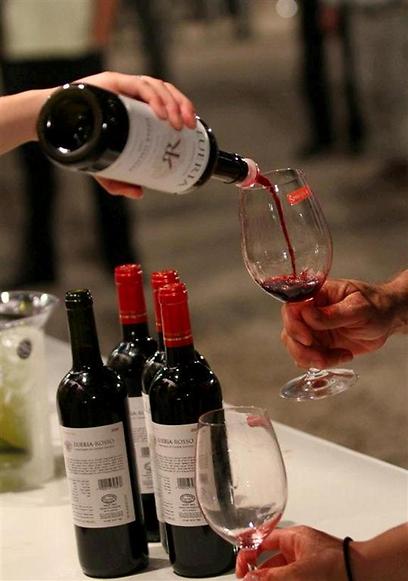
'The Rabbinate's alcohol supervision madness has now entered the wedding hall industry'
צילום: shutterstock
The Rabbinate's alcohol monopoly
Op-ed: Want to bring your own wine to your wedding? In Israel, a young couple just learned, you can either serve your guests cooked wine or pay the Rabbinate to send barmen of their own.
I thought I had already heard everything. Turns out I was wrong.

Rinat and Tom are going to get married this winter. They’ve been living together for three years and all of a sudden they decided that they had to get married right away. (Yes, I asked Rinat if she was pregnant and the answer was no, but she added a "smiley face" to her note, so who knows).
Be that as it may, a winter wedding is a challenge. They had dreamed of having a small wedding, but their families were pressuring them to have a more conventional affair, with the fancy hors d’oeuvres and full course meal.
The problem is that the fancy places operate only in the summer. In the winter, if you want a more glitzy kind of hall, they were warned, you have to hurry up and reserve it right away. So they’ve been running around like crazy these past few weeks, checking suitable venues.
"The food is your affair," they told their parents. "You can decide on the menu, but we’ll choose the alcohol. No need for you to bother about it, okay?" Even though they are students, they know about wine.
They found a hall, closed on the deal and, while talking over the menu, announced to the owner, with all due formality, that they would be bringing the wine on their own. Since the catering company has a kashrut certificate, they reassured the owner that they would be purchasing kosher wine, from a winery with supervision by the Chief Rabbinate, not the Conservative Movement, God forbid.
"Ah, but that’s not quite all there is to it," the wedding hall owner stammered, averting their gaze. He had had similar conversations with other couples, and he knew that it would be difficult to explain. "The Rabbinate has new regulations," he said. "Because my waiters and barmen are not Shabbat observant, I am only permitted to serve yayin mevushal (pasteurized wine)."
"What?" exclaimed the astonished Rinat and Tom.
You don’t need to be a sommelier to know that wine that has been pasteurized tastes like a pita that has been defrosted in a microwave oven. "But that’s the way it is," said the venue owner, "they have a monopoly."
The Orthodox interpretation of Halacha is very strict about the rules governing wine production. A non-Jew cannot take part in the process. Any winery that has been certified kosher by the Rabbinate is forbidden from employing non-Jews in any function whatsoever that requires coming into contact with the grapes, the barrels, and naturally, the wine itself.
Furthermore, Israel’s Rabbinate has added more stringent restrictions and ruled that Jews who do not observe the mitzvot are also considered non-Jews in this context, and are not permitted to touch the wine at any point during the production process. If they do, the winery will not be granted a kashrut certificate.

If you want to taste the wine from one of the barrels, the mashgiach will have to pour it for you (Archive photo: Ilan Harmati) (צילום: אילן הרמתי)
You could be a qualified, professional vintner at a winery such as Carmel Mizrachi or Recanati, circumcised and the son of a Jewish mother, who not only served in an elite IDF unit but also had a bar mitzvah, but if you are secular you cannot touch a single barrel of wine in your winery.
The supervisor (mashgiach) appointed by the Rabbinate will follow your every step, making sure that you do not touch anything, deliberately or unintentionally. If you want to taste the wine from one of the barrels – something that vintners do as a matter of course and as part of their professional duties – the mashgiach will have to pour it for you.
If you, the vintner or the winery owner, are secular, or a non-Jew, or both, it doesn’t really matter. You are simply disqualified. Racist? Arrogant? Nauseating? Indeed, but so what? Until this monopoly is challenged from without, why should any of this change?
Now the madness has filtered into the wedding hall industry.
You have two choices, the hall owner explained to Rinat and Tom. Either you serve yayin mevushal (wine that has been cooked, after which, according to Orthodox interpretation, even a Gentile or a secular Jew can serve it to your guests), or pay the Rabbinate to send barmen of their own (at a cost of a few hundred shekels each) and they will send trustworthy Jews, yeshiva students who want to make some money because the allowance they receive is insufficient. They will serve the wine at your affair.
Then, and only then, will you be permitted to serve kosher wine that is not pasteurized.
By the way, they are not so strict about this in the hotels, the hall owner explained, because they are backed by the strong hotel association lobby. But for us, the caterers and wedding hall owners, they have made the rules more stringent.
They also know that the wedding business is a money-making industry. And most of the couples pay, because who wants to serve cooked wine at their wedding?
Yizhar Hess is the executive director of the Masorti Movement in Israel.










